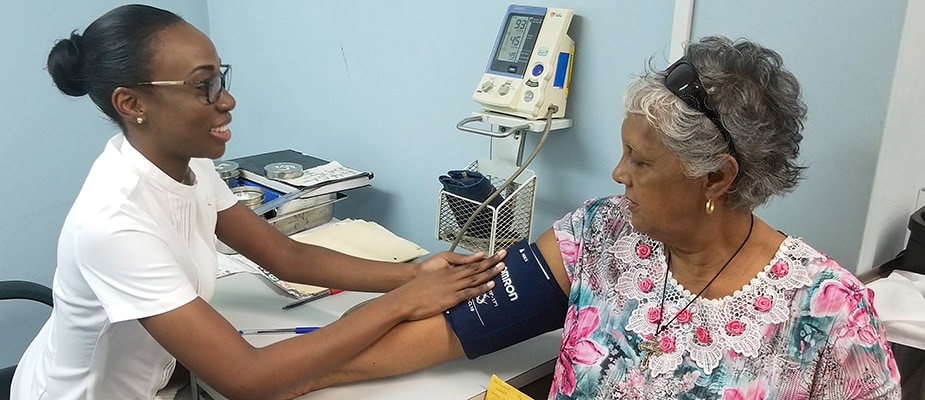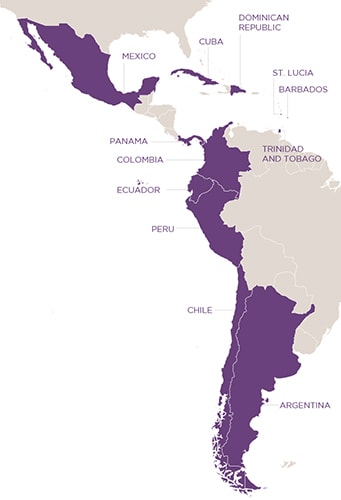A Beat Ahead in Latin America and the Caribbean
December 9, 2019

“I’m so full of life again!” enthused formerly hypertensive patient Clara, moments after completing a traditional dance at the Peru-Corea-Bellavista clinic in Callao, Peru. Clara’s performance was part of the launch of Peru’s HEARTS program, a national initiative to reduce premature deaths and disabilities from heart disease and strokes.
Rapid urbanization, aging populations, and the globalization of unhealthy lifestyles have fueled a global crisis of noncommunicable diseases (NCDs). In the Americas, NCDs such as heart disease, stroke, and diabetes cause nearly four out of every five deaths. Cardiovascular diseases alone account for nearly one-third of all regional deaths. Tragically, many of these deaths occur prematurely—before the age of 70. In addition to health consequences, NCDs also have devastating impacts on economies. High health care costs and productivity losses from NCDs undermine social and economic development.

Seniors dance during a weekly class for hypertensive adults at the Peru-Corea clinic. Photo: PAHO
Hypertension (high blood pressure), like Clara’s condition, is a leading risk factor for heart disease and stroke. While treatment is simple, effective, and affordable, many health systems are not set up to prevent, diagnose, and manage the condition. Peru, however, has joined a growing number of countries in a global effort to improve heart health and strengthen health systems using the HEARTS initiative.
HEARTS in the Americas
CDC teamed up with the World Health Organization, the Pan American Health Organization (PAHO), and other partners to develop a strategic approach to improving cardiovascular health through primary care. Launched in 2016, HEARTS includes six practical, evidence-based interventions that use standardized treatment, lifestyle coaching, essential medicines, team-based health care, and monitoring systems to reduce heart attacks and strokes. HEARTS is being implemented in 21 countries, including 12 countries in Latin America and the Caribbean.
An Initiative of the Countries

CDC works with PAHO to ensure that countries own and manage HEARTS. With support from CDC, PAHO uses a coordinated approach that focuses on ministry of health commitment, local stakeholder engagement, capacity development, and a systematic plan for expansion. CDC provides technical expertise to improve data quality in addition to monitoring and evaluating programs. CDC also supports international and regional experts participating in planning and technical meetings on how to implement these programs in country.
“HEARTS in the Americas is an initiative of the countries,” explained Dr. Pedro Ordunez, PAHO’s technical officer for the initiative. “HEARTS should be built on what already exists, using available resources, continuously improving performance and results, taking advantage of leadership and technical capabilities, and learning from successful programs. HEARTS is not an isolated project, parallel to the existing health care systems…its sustainability depends on effective integration of the model into the health system.”
The sustainability-focused approach also promotes country-to-country exchange, ensuring that countries learn from each other and follow best practices as they implement HEARTS. This also aids the development of national and regional expertise.
Global Impact
Country-led HEARTS programs in the Americas have already reached over two million adults at 131 health centers. By effectively addressing NCDs, countries are enhancing quality of life, preventing premature deaths and disabilities, improving productivity, reducing strains on health care systems, and promoting stronger economies. Clara is just one of many people whose lives have been enhanced, and perhaps extended, by this global commitment to confronting the NCD epidemic.
- Taking Health to Heart in Trinidad and Tobago, September 2019
- How Kerala Avoided a Chronic Disease Crisis, May 2019
- Zambia at the Forefront of Data for Health, Spring 2019
- How Senegal is Tracking the Silent Killer, Fall 2018
- Three Ways NCDs Impact Global Health Security, Winter 2017
- Hypertension Control in Barbados: Building a System to Fight the “Silent Killer”, Fall 2016